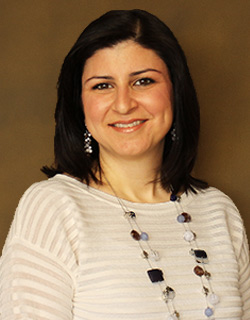Healthy Sleep Habits - Dr. Raya Wehbeh
March 11, 2021Did you get a good night’s sleep last night? The answer is “no” for almost one third of American adults. Sleep affects people in every age and life stage, and according to Raya Wehbeh, MD, Medical Director, Sleep Medicine at GBMC, “it’s important to make a point of getting enough sleep at night.” For many, the reason for not getting enough sleep is habit; however, there are other causes of sleep interruptions such as certain medications, environmental factors, mental health issues, and sleep disorders.
“When I talk to my patients,” Dr. Wehbeh said, “I look at them as a whole to understand where their sleep issues may be coming from. If they aren’t caused by a sleep disorder, we try to treat the root cause of the problem.” It is important to get a full medical history for each patient and hear their experiences with sleep. “We use what they are feeling as clues to find the medical issue,” she explained. If more information is needed, an in-lab or at-home sleep study may be ordered.
The Sleep Center at GBMC offers a home-like setting located within the hospital where
in-lab sleep studies are performed, and comprehensive sleep data is collected by certified technicians. Patients are connected to wires and spend the night in the Center. Data is collected on their breathing, brain waves, body movements, and more.
At-home sleep studies are also available for patients who can’t spend the night at the hospital or are more comfortable staying at home. While these devices collect less data than in-lab studies, they are more convenient, and are still accurate for diagnosing most sleep disorders. This is especially true for sleep apnea.
Sleep apnea is one of the most commonly diagnosed sleep disorders. It occurs when the body stops breathing during sleep or breathing becomes very shallow. This happens when the airway becomes blocked due to the muscles in the back of the throat and mouth touching each other during sleep. The brain sends hormones to wake the body up to resume breathing. This results in poor quality of sleep, and people experiencing sleep apnea often feel tired and less alert during the day. Untreated sleep apnea is also connected to severe health issues like high blood pressure, worsening diabetes, irregular heart rhythm, and even heart attack or stroke.
The typical treatment for sleep apnea is the use of a continuous positive airway pressure
(CPAP) machine during the night. While these machines are highly effective, patients are often resistant to them. “It’s an adjustment, of course,” expressed Dr. Wehbeh, “but CPAP machines have come a long way.” New technologies have made the machines significantly quieter and smaller, and features like humidifiers and temperature controls have been added for increased comfort. “A lot of times, people are very happy once they are used to the machine,” she said.
For people who don’t have a sleep disorder but may still have trouble sleeping, Dr. Wehbeh gave the following tips:
- Stick to a regular sleep/wake schedule
- Get seven to eight hours of sleep every day
- Create a bedtime routine that is done in the same order every night
- Use the bed for sleep only
- Avoid blue light and devices before bedtime
Dr. Wehbeh also covered topics such as tracking sleep through a fitness app, the effects virtual learning has on sleep, and snoring. To learn more about GBMC Health Partners Sleep Medicine, go to www.gbmc.org/sleep-medicine or call the office at 443-849-3901.




